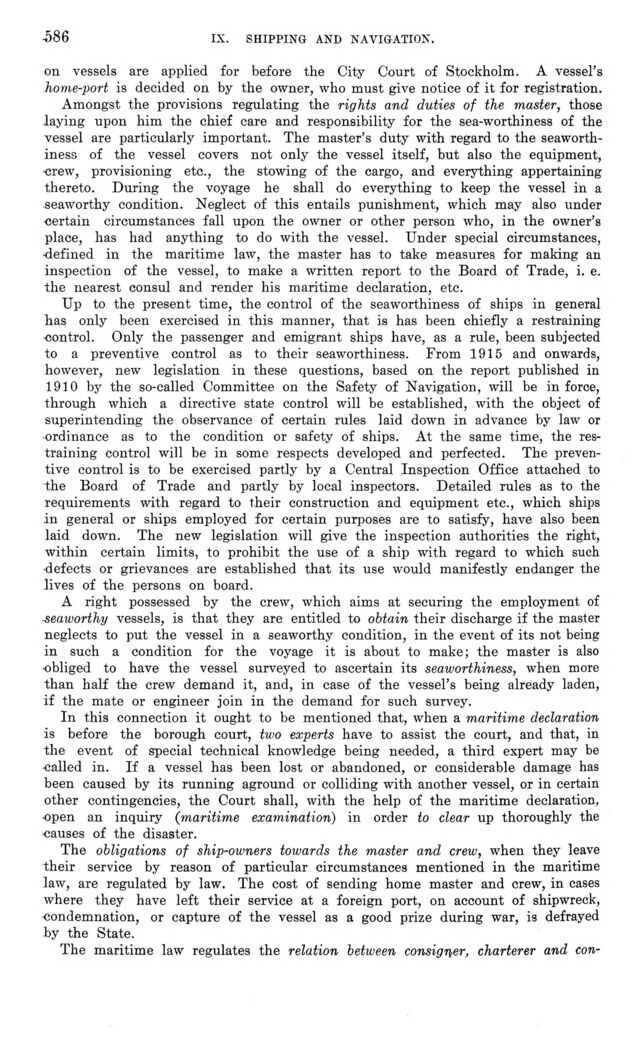
Full resolution (JPEG) - On this page / på denna sida - IX. Shipping and Navigation. By H. Rosman - Maritime Legislation. By E. Modig

<< prev. page << föreg. sida << >> nästa sida >> next page >>
Below is the raw OCR text
from the above scanned image.
Do you see an error? Proofread the page now!
Här nedan syns maskintolkade texten från faksimilbilden ovan.
Ser du något fel? Korrekturläs sidan nu!
This page has never been proofread. / Denna sida har aldrig korrekturlästs.
■586
ix. shipping and navigation.
oil vessels are applied for before the City Court of Stockholm. A vessel’s
home-port is decided on by the owner, who must give notice of it for registration.
Amongst the provisions regulating the rights and duties of the master, those
laying upon him the chief care and responsibility for the sea-worthiness of the
vessel are particularly important. The master’s duty with regard to the
seaworthiness of the vessel covers not only the vessel itself, but also the equipment,
•crew, provisioning etc., the stowing of the cargo, and everything appertaining
thereto. During the voyage he shall do everything to keep the vessel in a
-seaworthy condition. Neglect of this entails punishment, which may also under
-certain circumstances fall upon the owner or other person who, in the owner’s
place, has had anything to do with the vessel. Under special circumstances,
defined in the maritime law, the master has to take measures for making an
inspection of the vessel, to make a written report to the Board of Trade, i. e.
the nearest consul and render his maritime declaration, etc.
Up to the present time, the control of the seaworthiness of ships in general
has only been exercised in this manner, that is has been chiefly a restraining
■control. Only the passenger and emigrant ships have, as a rule, been subjected
to a preventive control as to their seaworthiness. From 1915 and onwards,
however, new legislation in these questions, based on the report published in
1910 by the so-called Committee on the Safety of Navigation, will be in force,
through which a directive state control will be established, with the object of
superintending the observance of certain rules laid down in advance by law or
•ordinance as to the condition or safety of ships. At the same time, the
restraining control will be in some respects developed and perfected. The
preventive control is to be exercised partly by a Central Inspection Office attached to
the Board of Trade and partly by local inspectors. Detailed rules as to the
requirements with regard to their construction and equipment etc., which ships
in general or ships employed for certain purposes are to satisfy, have also been
laid down. The new legislation will give the inspection authorities the right,
within certain limits, to prohibit the use of a ship with regard to which such
•defects or grievances are established that its use would manifestly endanger the
lives of the persons on board.
A right possessed by the crew, which aims at securing the employment of
seaworthy vessels, is that they are entitled to obtain their discharge if the master
neglects to put the vessel in a seaworthy condition, in the event of its not being
in such a condition for the voyage it is about to make; the master is also
•obliged to have the vessel surveyed to ascertain its seaworthiness, when more
than half the crew demand it, and, in case of the vessel’s being already laden,
if the mate or engineer join in the demand for such survey.
In this connection it ought to be mentioned that, when a maritime declaration
is before the borough court, two experts have to assist the court, and that, in
the event of special technical knowledge being needed, a third expert may be
•called in. If a vessel has been lost or abandoned, or considerable damage has
been caused by its running aground or colliding with another vessel, or in certain
other contingencies, the Court shall, with the help of the maritime declaration,
•open an inquiry (maritime examination) in order to clear up thoroughly the
causes of the disaster.
The obligations of ship-owners towards the master and crew, when they leave
their service by reason of particular circumstances mentioned in the maritime
law, are regulated by law. The cost of sending home master and crew, in cases
where they have left their service at a foreign port, on account of shipwreck,
condemnation, or capture of the vessel as a good prize during war, is defrayed
by the State.
The maritime law regulates the relation between consigner, charterer and con-
<< prev. page << föreg. sida << >> nästa sida >> next page >>